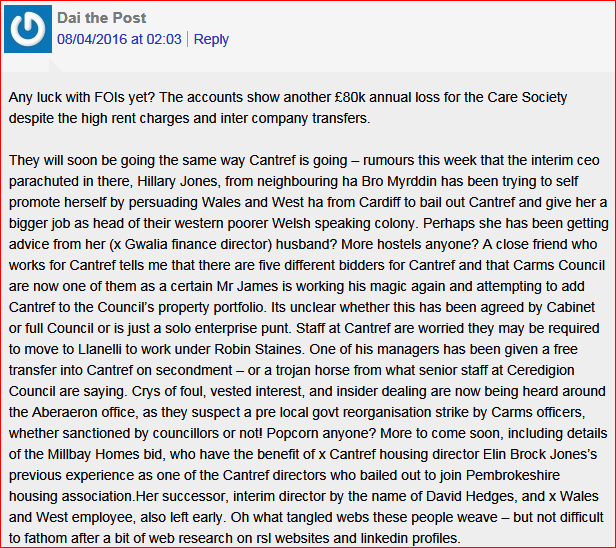If you read this blog regularly you’ll know about the takeover of Cantref, a housing association based in Newcastle Emlyn, by Wales and West Housing of Cardiff, a company with strong links to the Labour Party. For those catching up, I advise starting with the post Cantref: ‘Welsh’ Labour Takeover Challenged? To give some chronological marker, the takeover was officially registered with the Financial Conduct Authority 19 September 2016.
Even before the takeover I was receiving information from a person or persons I must assume were ‘in the know’. This information came by a number of routes, and was of varying degrees of confidentiality; what came as comments to this blog I can use in full, but information received by more discreet routes will require more circumspect treatment.
Let’s start with a comment from July 2015. Two points from it are worth noting. First, I believe the “something else going on” is a reference to the increasing suspicion that Cantref was about to be sold down the river. Second, the reference to “David Hedges of Cyngor Da” (Good Counsel/Advice) was a little confusing at the time because Hedges is a consultant and Cyngor Da is his company, yet he’s described as one of Cantref’s directors.
I shall return to our Dai, son of Glamorgan cricketer the late Bernard Hedges, later.
♦
As we now know, Cantref was indeed sold down the river, taken over by Wales and West Housing of Cardiff, ‘Welsh’ Labour’s favourite housing association. (Though the ‘Association’ bit was dropped from the name in 2012, now it’s just Wales and West Housing.)
As the takeover was going through I was being told about Wales and West “surveyors” evaluating Cantref’s stock and joking about taking down opposition party – mainly Plaid Cymru – placards and posters from WWH properties in the Cardiff West constituency during last year’s Assembly election campaign. There was no attempt to hide the fact that Wales and West Housing is ‘Welsh’ Labour by another name.
Something else I was hearing through other channels – though I confess I paid little attention at the time – was that Wales and West is linked somehow with the Mid Wales Housing Association. Now MWH inherited much of its stock, either directly or indirectly, from the Development Board for Rural Wales, that agency set up to ‘repopulate’ the five counties of central Wales. Part of the DBRW strategy included building homes for ‘key workers’, which in practice meant housing the complete workforces of relocating English companies or factories.
As I say, I should have paid more attention to this Mid Wales Housing reference if only because something interesting had emerged a few years earlier.
The nub of the story I’m referring to can be found in this news item from 2012 which tells that the Development Board for Rural Wales borrowed money at 14% interest over 50 years to build those ‘key worker’ houses, and when the DBRW (together with the Land Authority for Wales) was merged with the Welsh Development Agency in October 1998 that debt was transferred to the ‘Welsh’ Government.
Which if you think about it was odd . . . if not impossible.
Because the devolution referendum was held on September 18th 1997 and the first Assembly elections on May 6th 1999. Which means that when this transfer was effected in 1998 there was a devolutionary void. The transfer was therefore accomplished by Westminster, and this saw our incoming AMs confronted with a fait accompli. (Makes you wonder what else might have been dumped on our Assembly before it came into existence.)
In addition to the news story there was an interesting discussion on the blog of Montgomeryshire Tory MP Glyn Davies. Davies was the last chief executive of the DBRW.
♦
Now we hear of deals being struck between Mid Wales Housing, Wales and West Housing and an unnamed English housing association to bring in tenants to Llandrindod. The ‘Paul Diggery’ referred to is Paul Diggory, currently chair of the Chartered Institute of Housing in Wales, and before that, for over 15 years, chief executive of North Wales Housing.
The ‘Ann Hinchy’ mentioned is Anne Hinchey, chief executive of Wales and West Housing, wife of Graham Hinchey, Labour councillor for the Heath ward in Cardiff.
Naturally, I tried to make enquiries about WWH developments in Llandrindod. Turning to Google I came up with this . . . but the link is broken. I was unable to find anything for Llandrindod on the Wales and West website, either.
So what ‘Jonny English’ seems to be saying is that Wales and West Housing, with its HQ in Cardiff, its new western office (the former Cantref office) in Castell Newydd Emlyn, it’s northern base on Deeside, is now trying to get a footprint in the middle by linking up with Mid Wales Housing and some English housing association.
Entirely predictable, because when we look at who’s running MWH we see the usual English mediocrities staring back at us from the Executive Group page. Without whom we’d still be living in caves.
I’m sure ‘Jonny English’ will read this, as will others with information, so please let me have more details, most importantly, the name of the English housing association involved in this scheme. I’d also appreciate clarification on the relationship between WWH, MWH and the English outfit (the one from England).
♦
Let us return now to David Hedges. After being at Cantref when the transfer to Wales and West was arranged, the word on the street is that he’s now ensconced at Pembrokeshire Housing! What can it mean?
Again, for newcomers, or those with short memories, Pembrokeshire Housing is a body I have written about many, many times. Not just the parent body but also its bonny offspring Mill Bay Homes. I suggest you start here with Mill Bay Homes and Pembrokeshire Housing and then Mill Bay Homes and Pembrokeshire Housing 2.
The set-up is as follows. (And here I have to be careful cos writing about this lot has resulted in Jac getting solicitor’s letters.) Pembrokeshire Housing appears to be a normal housing association, grabbing its whack from the Welsh public purse to build social housing, much of which is allocated to persons and families having no previous connection with the area, or indeed with Wales.
Back around 2011 someone came up with the wheeze of using the dormant Pembrokeshire Housing Two Thousand Ltd to build properties and sell them on the open market. The name was soon changed to Mill Bay Homes. Now, after £7m+ has been transferred from parent to subsidiary, and houses built for retirees, investors, and friends of the MBH management, it seems that questions are – belatedly – being asked about this highly unusual arrangement.
This might explain the recent ‘retirement’ of Peter Maggs, Pembrokeshire Housing’s chief executive, and the arrival of David Hedges as – so ‘Dai the Post’ tells us – interim housing director.
Even allowing for the fact that within the social housing racket field in Wales there are bound to be connections and linkages, there seem to be far too many between Cantref, Pembrokeshire Housing, Wales and West and Campbell Tickell, of whom more in a moment.
As I said at the outset, David Hedges appeared in Cantref just before it was handed over to Wales and West Housing, like some harbinger of doom. Now we hear that he’s involved with Pembrokeshire Housing, and we’re also told that Wales and West is again manoeuvring into position to pounce. Interestingly, if we consult David Hedges’ Linkedin profile we see that he has worked for Wales and West. (If you can’t access the Linkedin profile click here for a downloaded version.)
UPDATE 26.01.2017: An anonymous source tells me that Dai Hedges is more of a fire-fighter than an assassin, sent in when things are going pear-shaped. Which may be true, but won’t be much consolation to those at Pembrokeshire Housing.
♦
I’m reasonably certain that Jonny English is somewhere in the north, while Dai the Post is probably in the south west, so it’s interesting that both mention Campbell Tickell; which gives me the opportunity to explain for late arrivals where this management consultancy fits into the big picture.
Campbell Tickell is the company of Greg Campbell and James Tickell, both Labour Party supporters. And as his Linkedin profile tells us, Campbell has even worked for the party. Also note the reference to Common Purpose, that shadowy, some say sinister, Labour-leaning, globalist organisation for professionals in public life.
In addition to being rather suspect in its motivation and workings Common Purpose has a distinctly contemptuous attitude towards Wales. Check out this list of CP’s programmes for 2017. Scotland and Northern Ireland are covered, as are the regions of England (even individual cities in Scotland and England), but Wales might as well not exist. Search for ‘Wales’ on the Common Purpose website and you’ll turn up this little story about Chinese students on a flying visit to the Assembly in December 2015, nothing more.
Here we have a network that results in English appointees to many Welsh jobs. On the ground, it operates thus. ‘Welsh’ Labour helps its very own housing association to expand within Wales to the point where – already the largest – Wales and West Housing becomes dominant. (What’s the next stage?) To avoid accusations of cronyism it passes the recruitment process to Campbell Tickell, a Labour-supporting Common Purpose recruitment agency.
This procedure is not confined to housing associations, it can be found across public life in Wales, to the extent that I sometimes wonder if devolution is nothing but a scam to create a few thousand jobs for our neighbours in the £50,000+ salary bracket. Worth asking because devolution is achieving sod all for us Welsh.
This system satisfies two vaguely linked agendas.
On the one hand, it helps the Labour Party compensate for its declining electoral support by spreading the party’s influence, via Wales and West Housing and other agencies, into areas where many would rather Glasgow kiss a rough stone wall than vote Labour. Areas such as Ceredigion, Pembrokeshire, Powys.
But the system also serves the agenda of civil servants in Cardiff and elsewhere, who answer to mandarins in London, and whose overarching ambition is to keep a check on – even roll back – devolution. One of the best ways of achieving this to ensure that as few Welsh people as possible fill positions of authority. This creates the impression that we Welsh can do nothing for ourselves and also comes in useful when ‘consultations’ are undertaken to determine future policy direction.
♦
All of which brings us back to my post earlier this month Housing Associations: Secret or Public?, in which I explained why Labour politicians and civil servants wish to maintain the secretive status of our public funds-guzzling housing associations. I suggest you read it.
And if you have a beef with a housing association then there’s no point in appealing to Nick Bennett, the Public Services Ombudsman for Wales. Bennett was CEO of Community Housing Cymru, the umbrella organisation for housing associations, from July 2006 until July 2014. Bennett is also close to ‘Welsh’ Labour, having been in business with a former Labour minister.

To take the explanation a stage further, we have a system of social housing, increasingly controlled at national level and managed at local level by people who know nothing about Wales and without any concern for – or even contemptuous of – Welsh identity, using vast sums of Welsh public funding, and regularly housing people with no connection to Wales. Because of course social housing in Wales is locked into an Englandandwales system. I have that on impeccable authority.
Back in early December 2010 I wrote a reader’s letter to the Wasting Mule seeking answers from Nick Bennett to a number of points. Instead of publishing it the Letters Editor passed my questions on to Bennett who then e-mailed me directly, saying: “Strong local connection cannot be the only acceptable qualification for social housing in Wales. Social housing is a scarce resource for homeless people and those on low incomes who can’t access housing in the private sector. There are over 2 million people on waiting lists for social housing”.
♦
Wales is the most corrupt country in Europe because it suits so many to have it that way. This corruption helps the Labour Party in Wales maintain power and influence despite declining support at the ballot box. Facilitated by Common Purpose and other bodies, this corruption discredits devolution and thereby strengthens England’s hold on Wales to the point where assimilation will have been achieved before most of us realise it.
If I was working for Pembrokeshire Housing I’d be getting worried now, because the vultures are circling – they may already have landed! And yet, just like Cantref, you brought it on yourselves, in your case with the insane decision to fund a private house builder subsidiary. And what will happen to Mill Bay Homes when Wales and West Housing takes over?
To understand how this system of colonialist corruption operates you have to recognise and understand the linkages, how they influence and contaminate public life in Wales. Social housing is the perfect example because it brings together so many threads. And it explains why the ‘Welsh’ Government and the civil servants who ‘advise’ it want to save housing associations from public scrutiny.
But don’t think for one minute that the corruption is confined to our housing associations. Corruption is endemic in Welsh public life – because it’s encouraged.
♦ end ♦














